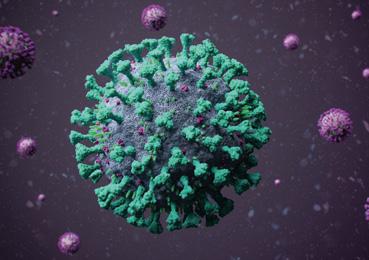
3 minute read
COVID-19: endocrine−metabolic complications
COVID-19:
endocrine–metabolic complications
Advertisement
Sandro La Vignera The 2019 coronavirus outbreak, caused by SARS-CoV-2, has focused researchers’ interest on understanding the disease’s pathogenesis, treatment and complications. So, what are the possible long term endocrine−metabolic effects in COVID-19 patients?
Comparison with SARS
Knowledge of the long term complications associated with SARS-CoV, the aetiological agent of SARS in 2003, may be useful in identifying similarities with SARS-CoV-2.1
SARS-CoV is known to directly damage pancreatic cells, due to their high expression of angiotensin-converting enzyme 2 (ACE2). Pancreatic damage causes transient or permanent diabetes. Additionally, SARS-CoV has been isolated in the adrenal and pituitary glands of SARS patients, thus providing evidence of the virus’s ability to infect these endocrine glands and, possibly, alter their function. In fact, some studies have reported that the adrenal response to the adrenocorticotrophin stimulation test is suboptimal in patients with SARS, although there are no definitive data. Some have reported the presence of central hypothyroidism in SARS survivors, suggesting that SARS-CoV alters pituitary function. Finally, this virus appears to harm gonadal function, mainly due to testicular expression of ACE2.1
Discoveries in COVID-19
This evidence sheds light on the possible long term complications of COVID-19. SARS-CoV-2 is, in fact, capable of damaging various organs via an autoimmune mechanism. Therefore, the onset of autoimmune endocrinopathies such as thyroiditis, adrenalitis, etc. could be predicted in COVID-19 patients.1
Consistent with this, subacute thyroiditis has been reported in COVID-19 patients after resolution of the acute phase of the disease.2 ACE2 expression in the thyroid gland appears to be the main mechanism by which SARSCoV-2 infects thyrocytes, and active viral replication induces their lysis.2 A recent study also explored the impact of SARS-CoV-2 infection on the hypothalamic-pituitary-adrenal (HPA) axis, concluding that there was impaired function of central origin in the patients studied.3 ACE2 is expressed in both the adrenal and the pituitary glands, thus providing an explanatory mechanism for these effects.
ACE2 is also expressed in the testis, and it has been suggested that long term hypogonadism could potentially occur in SARS-CoV-2-infected patients.4 Indeed, serum levels of luteinising hormone and total testosterone (TT) were found to be significantly lower in 286 symptomatic male patients with laboratory-confirmed COVID-19, when compared with healthy men. Lower TT levels also predicted the patients’ clinical outcomes.5
Taking all this into account, a long term endocrine follow-up of COVID-19 patients should reasonably include the evaluation of the thyroid, the HPA axis and gonadal function. However, further research is still needed, including assessment of pancreatic function after COVID-19 recovery.
Sandro La Vignera, Rossella Cannarella, Laura M Mongioì, Federica Barbagallo, Antonio Aversa,* Rosita A Condorelli and Aldo E Calogero
Department of Clinical and Experimental Medicine, University of Catania, Catania, Italy *Department of Experimental and Clinical Medicine, University Magna Graecia of Catanzaro, Italy
REFERENCES
1. Mongioì et al. 2020 Endocrine 68 467−470. 2. Khatri et al. 2021 European Thyroid Journal 9 324−328. 3. Alzahrani et al. 2021 Endocrine Practice 27 83−89. 4. La Vignera et al. 2020 International Journal of Molecular Science 21 2948. 5. Salonia et al. 2021 Andrology doi: 10.1111/andr.12993.
10th Arrigo Recordati International Prize for Scientific Research
€100 000 for research into pituitary disorders
This research grant of €100 000 will be given to an outstanding novel basic, translational or clinical research project focusing on pituitary disorders.
Young investigators of all nationalities working on pituitary disorders are eligible.
The winner will be selected based on the quality of the proposed research by an independent panel of internationally recognised experts: Robert J Desnick (USA), Andrea Giustina (Italy) and Shlomo Melmed (USA). The successful applicant will be announced at ECE 2022 in Milan, Italy (21−24 May 2022). Deadline for preselection
31 August 2021
Full applications by
28 February 2022
For more information or to submit an application, see






